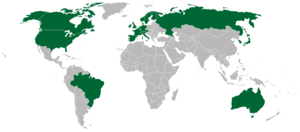Parisian club
The Paris Club ( French: Club de Paris , Eng. Paris Club ) is an informal body in which state creditors meet with a debtor country that is in financial difficulties for the purpose of debt restructuring negotiations or debt relief . The club mediates between donor countries and those countries that have problems with repaying public loans or development aid loans or that have become debtors of the respective state due to delays in payment in projects with export credit insurance .
General information and requirements for taking action
The conference of government representatives is neither an international organization in the sense of international law nor an international non-governmental organization , as there is a lack of a corresponding founding agreement and sufficient continuity. In addition, it is not a permanent institution, even if (solely due to years of practice) there is a fixed conference location with a permanent secretariat. He only enters into rescheduling negotiations on condition that the IMF has given a positive vote and that an agreement on a credit program has been reached between the IMF and the debtor country.
A precondition for rescheduling negotiations in the Paris Club is an imminent or already occurred default by the debtor state in servicing foreign liabilities (“imminent default criterion”). Aid is made dependent on a forecast by the International Monetary Fund on the development of the balance of payments for the following year. This conditionality generally presupposes, among other things, that the debtor country is involved in an ongoing IMF program that is supported by a credit facility ( stand-by loans , etc.). This in turn is made dependent on conditions. The degree of debt rescheduling is then determined by the financing gap proven by the IMF. There is a chain of causality that starts at the IMF. The IMF must have approved financial aid to a debtor state before the Paris Club takes action. If the latter enters into rescheduling negotiations with the debtor country, the London Club can also act if necessary . As part of the Paris Club, only the interest and repayment payments due within a relatively short consolidation period are regularly rescheduled. The results of the Paris Club negotiations are recorded in a protocol that must be implemented in bilateral debt rescheduling agreements. Only these agreements are binding under international law. When restructuring, the forum follows certain standards that were developed on the basis of past cases and are called "Classic terms", "Houston terms", "Naples terms" and "Cologne terms". This can be associated with debt relief. An agreement between a debtor country and the Paris Club is only possible if there is already an agreement with the IMF. If the IMF negotiations fail, this conditionality will lead to an IMF credit freeze and will not provide any debt relief from the Paris Club.
History and organization
In 1956, a meeting was called for the first time in Paris at the request of Argentina . The then French finance minister Pierre Pflimlin invited his Argentine counterpart to Paris for a meeting in which Argentina wanted to discuss its debt situation with all creditor states at the same time. This practice was well received by those involved and the practice was extended to other countries.
Since then, the club and a small organization have had their "seat" in the treasury of the French finance ministry. Traditionally, the director of the Treasury acts in personal union as club president. The Paris Club also has a permanent secretariat to which inquiries can be made. This is based solely on the tradition and constant practice that has emerged since 1956. The club has no written legal basis - neither a government contract nor an organizational constitution.
The creditor states meet ten to eleven times a year to discuss the debt situation of different countries and negotiate with them. Over the years, relatively strict rules for these negotiations and the various models of debt rescheduling and debt relief have developed, but these are also not binding and can only be read in secondary literature that is barely accessible to outsiders. The result of these discussions is recorded in minutes , which formally again only represent a recommendation, but are in fact followed. On the basis of this protocol, binding international agreements are concluded between the respective creditor state and the debtor state, in which the rescheduling or debt relief with regard to the respective claim and details such as the interest to be paid in the future are specified. The claims of private banks (including those made by the banks by private companies) against the debtor state are dealt with separately in the London Club.
statistics
Since its inception, it has brokered 421 agreements with 88 debtor states with a volume of 553 billion US dollars (October 2011). The last spectacular decision resulted in extensive debt relief for Iraq by 2008. In February 2006, the US announced complete debt relief for Afghanistan in the amount of 108 million US dollars. Nigeria was the first African country to pay off its debts at the Paris Club. US $ 4.5 billion was transferred on April 21, 2006. In July and August 2005, due to the good oil business, Russia had started to repay its debts to the agreed donor countries early, with the repayment being made in installments. On August 21, 2006, Russia paid its remaining debt to the Paris Club. Cameroon was waived on June 18, 2006 its debt of 3.5 billion except for a remainder of 27 million US dollars.
Members, observers and debtors
See also
Web links
- Official website
- Additional information
- Detailed information from the BMF
- Deutsche Bundesbank: Worldwide organizations and bodies in the field of currency and economy (PDF; 820 kB)

